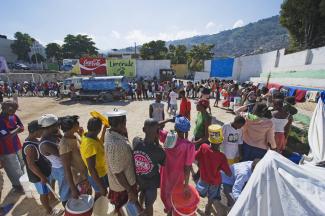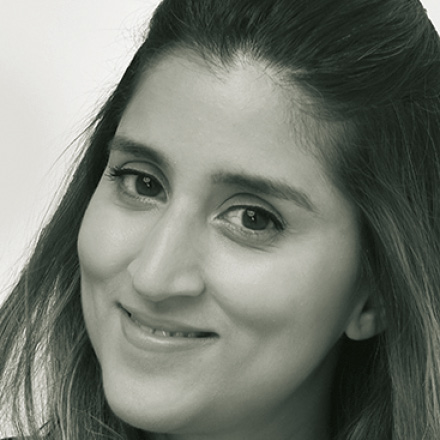Beyond aid
Regaining solidarity

Some economists want to discontinue aid altogether. Dambisa Moyo, the Zambian investment banker, is among them. She argues that aid does not solve African problems, but actually creates them. She believes that free-market tools such as loans and investments are the only real drivers of development.
Raoul Peck would also like to see aid end. He is a film director and former culture minister of Haiti. In his eyes, however, poverty is caused by free markets: "We have been paralysed by capitalism and the financial industry." He says he is tired of the talk about corrupt and incompetent elites, poor governance and related issues in developing countries. These phenomena are universal, according to him, so they cannot be the reason for poverty in the global south.
Profit-driven
In Peck’s view, the profit motive has even corrupted humanitarian agencies. To him, that became evident when he was shooting his documentary "Fatal Assistance", which was screened at last year’s Berlinale film festival. Peck is adamant: "Those who claim to help, have no idea of what they are doing; they are actually doing the opposite of what they claim." According to him, the agencies lack a coherent strategy and are driven by money. The people in need, he adds, are not interested in that kind of aid anymore. Speaking at the "Beyond aid" conference in Frankfurt in February, however, Peck did not offer any solution on how to improve matters. The event was organised by medico international, the non-governmental humanitarian agency, with support from Heinrich Böll Foundation, Rosa Luxemburg Foundation and the local university’s Institute for Social Studies.
According to the film director, the international agencies did not believe Haiti’s people had any resilience of their own in 2010. Similar complaints are common in many developing countries. All too often, those who need support are never asked what they desire and what they require, and must simply accept what aid agencies impose.
For such reasons, Romeo Ntamag has decided to no longer accept aid money. After a failed attempt to migrate from Cameroon to Europe, he started a self-help group of migrants in Bamako, the capital city of Mali. The group is supporting its target group with shelter, legal advice, psychological counselling and recommendations on how to prevent HIV/AIDS. He does not want any agency funding: "We do not want to be reduced to beggars."
Ntamag does not have faith in official development assistance (ODA) either: "The elites spend most of ODA on cars, houses and luxury goods for themselves." The disadvantaged people, whom the money is supposed to support, do not get any of it," he says. The 35 year old man insists that donors need to gather more and better information on what the poor really need and what the local context looks like.
Shreen Abdul Saroor is a Sri Lankan human rights activist who similarly rejects aid money. She co-founded two organisations that campaign for women’s rights. She is disappointed in the international community because it does not take interest in the fate of Sri Lanka’s Tamil minority, which continues to be marginalised after the end of the civil war. Saroor believes her job is to empower women to fight for their rights. She wants to challenge the extensive power of Sri Lanka’s military by organising rallies, bringing to court cases of abduction and rape, and raising awareness for people’s grievances.
How to save aid
Thomas Gebauer, medico international’s executive director, says the global community needs a debate on "how to save aid". He opposes the neo-liberal doctrine of unlimited personal responsibility. To explain his case, Gebauer points to microfinance institutions. Millions of people have been drawn into a vicious cycle of indebtedness, he says, and most of them took their first microcredit because they needed food or health care. Donors’ claim that microloans basically serve investment purposes is wrong, Gebauer points out. His demand is that people in need must not be treated as entrepreneurs, but rather deserve solidarity and legal entitlements to support.
Gebauer is not comfortable with philanthropy either. He considers the growing influence of institutions like the Bill and Melinda Gates Foundation harmful and speaks of "refeudalisation". People’s social inclusion, he argues, must never depend on the whims of rich individuals, but rather be based on legislation that lives up to all human-rights principles (please note essay by Ian Christoplos, p. 121 ff.). For all countries in the world to become able to afford adequate social-protection schemes, Gebauer suggests the international community should establish some kind of international transfer system.
Cornelia Füllkrug-Weitzel, the president of Brot für die Welt, a Protestant charity, similarly emphasises the need for solidarity. In her eyes, the churches and trade unions are torch bearers for solidarity, and both kinds of organisations depend on solidarity. "Unfortunately, churches are not considered to be cool these days," she says and adds that dominant ideology revolves around individual freedom, not communities’ welfare. „We must regain solidarity," she demands.
Conference participants in Frankfurt agreed that aid must become less donor-centred and pay more attention to target groups. Donors’ understanding of how the poor live and what they need was generally considered inadequate. The consensus was that the overarching goal must be to empower people to take their fate into their own hands, and that the current aid architecture is not geared adequately to cooperation and solidarity.
Sabine Balk












